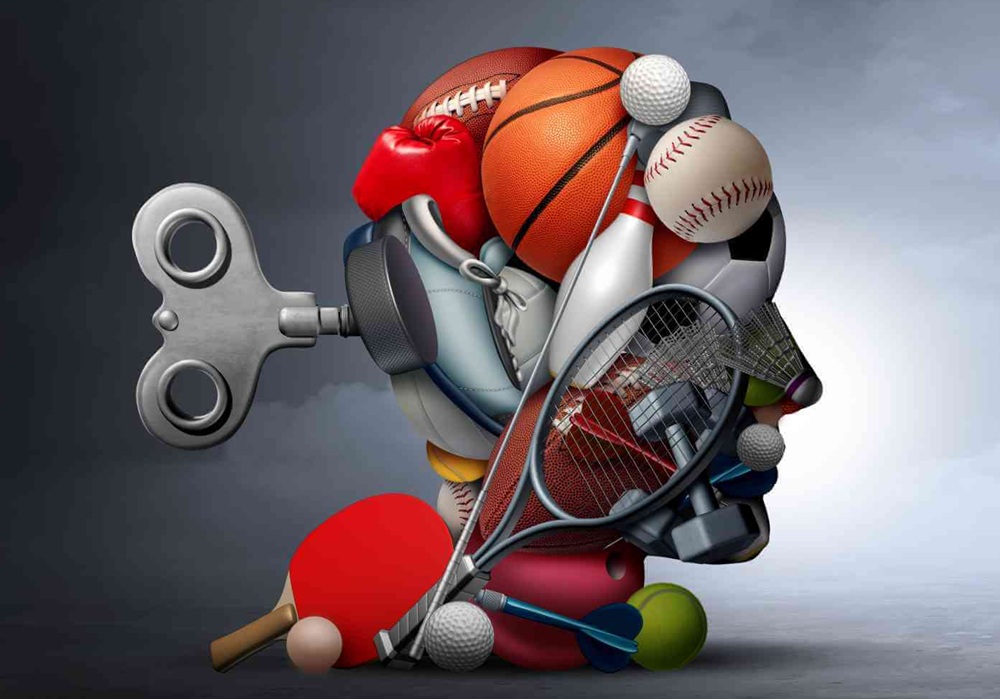On January. 20th, 2018 Michael Phelps revealed he has suffered from suicidal thoughts and depression. On July 27, 2021, Simone Biles withdrew from the Tokyo Olympics after revealing that she was suffering with a bout of “The Twisties. In the closing moments of the game on September. 11, 2024, Chicago Cubs closer Porter Hodge suffered an anxiety attack on the pitch. These events highlight the fact that the best athletes in the world are susceptible to stress that comes with competing at the highest standard.
“I think [professional] players do feel that all the time” said South Bend Cubs Development Coach Collin Adrews. “Nobody wants to tell anybody else that they aren’t happy. No matter …[who]… you are, it does not feel good to tell somebody that you’re not happy or that you’re having problems.”
Is sport more mental or physical: A complete analysis
An old saying goes “sports are 80% mental and 20% physical.” However, has anyone considered the meaning behind this statement? All athletes from high school to professional athletes – struggle to maintain their mental health that goes far beyond the scoreboard. The pressure to perform and maintain balance between the demands of school, life, sports and the emotional highs and lows of playing all add to the mental stress. The idea that “sports are 80% mental and 20% physical” is derived from the notion that, even if athletes are completely physically present and well-prepared the place they are mentally determines their ability to perform.
The concept of good mental health is different from one athlete to another. How different people manage mental health may also differ. For some, a thick skin is a part of their personality and they are in the gym every day, remaining the quiet, shutting out the noise. That’s the way they’re wired. Some rely heavily on their family members, friends and even teammates to keep them in check and clear of their heads. While inner strength is crucial however, it’s equally important to be aware of the times when external support is required. The athletes can’t carry the load on their own, and receiving help isn’t an indication of weakness, but evidence that they are strong.
If you are not familiar with, or who are looking to learn in this piece, scenarios of challenges athletes have to face are having to deal with anxiety about performance or the anxiety of not meeting the standards of others, coping with the pressure from teammates and coaches and fighting challenges (physical as well as mental) and managing the demands of a triple risk’ (sports, personal life as well as academics). After having a conversation to John Adams baseball and basketball player Garrett Miller about the triple threat, he shares what he believes to be the most crucial for students to focus on: “Be organized and create good habits early in life, in and out of sports, it will help so much.” As of now being aware of the challenges is an important thing, but knowing how they impact athletes and the way they deal with them is a completely different.
From performance anxiety to the smallest of things The most significant aspect of this is that one is their self-defeating critic. According to Collin Andrews in an interview, “I think the biggest mental hurdle… [players] face is that there is so much expectation, from other people and yourself.”
This type of criticism usually outcome in an excessive doubt about being a failure or not living in line with expectations. Thus, it can create a anxiety about failing. This type of anxiety can be crippling. It is common for athletes to replay their past performance in their heads, focusing on what went wrong instead than celebrating their accomplishments. Self-talk that is negative will completely kill the athlete’s confidence, and can create the cycle of worry about making mistakes can cause them to mess up more. However, there are strategies to reduce anxiety! Strategies like positive self-talk, being in the moment and communicating with trusted family members and friends can assist athletes in changing their fear into confidence, and allow them to be at their perfect when it is really important.
The ability to overcome setbacks, both psychological as well as physical, is a major aspect of the journey of an athlete. If it’s a slump during a competition or personal injury Athletes often have to overcome challenges that test their endurance. When asked how much of the sport is physical and mental, Andrews said, “Just imagine the most awesome thing you’ve ever accomplished and the most amazing thing you’ve accomplished in your academic life, or physically… Which was your mind thinking while you were doing it? The answer, most times, will be that that you were not thinking. You’d been practicing and prepared and you were aware of what to do when an incident occurred. This is the reason that over 80% of the game is mentally.” Being able to recover from such events is not just physical recuperation but also mental endurance.
A strong mental attitude allows athletes to be focused on their objectives, learn from their mistakes and retain confidence even in the face of challenges. Strategies like setting several small goals that are needed to actually achieve bigger goals, practicing mindfulness, and seeking out support from colleagues or coaches can aid athletes in overcoming these challenges and bounce back more resilient. As we’ve mentioned before, Team USA star female gymnast, Simone Biles, pulled out of the 2020 Olympics due to mental health issues. Biles took a break for reasons of health and was then investigated for the decision. Despite the backlash she faced and a much-needed rest and recuperation time, Simone returned to the Olympic gymnastics circuit the following year at Paris winning 3 gold medals for the team, all-around and vault.
In balancing the demands of sport and managing other aspects of life is among the most difficult challenges athletes confront, particularly as the level of competition rises. Bluffton University basketball player Brendan Williams (class of 2026) provides the desirable method of dealing with the triple threat the need to “stay organized and prioritize my tasks.” Williams additionally notes it’s likely to be times which are stressful, but if you stay focused and keep going, you’ll get through. When you’re watching a sport such as tennis, baseball, rugby or whatever, they do not know what’s going on in the background. They only see the player at their best however, what’s usually obscured is the emotional and mental thoughts these athletes face both in and out of the sport. “When you don’t have the ability to be mentally tough, get out and seek help because there’s somebody you have in common… as well they’ll be able to assist you. If they aren’t able to help you, they’ll have someone who can.” That’s Collin Andrews’ advice to athletes who are struggling with their mental health and feel that they have to “tough it out”.
Garrett Miller was asked if you think satisfying can be done in order to help athletes mentally health on the school-level. “I believe that the mental health of a student-athlete has a lot to do with the culture of the program.” Miller continues to discuss how an healthy relationship with teammates and coaches is vital to helping the athlete succeed. Bluffton’s Brendan Williams feels as though the importance of supporting athletes in their mental health at college is in place but isn’t being highlighted satisfying. “There is greater awareness regarding the mental health of athletes’ health currently, yet it’s often omitted. There are more support and resources that are in place for college athletes, particularly for smaller schools.” Williams acknowledges that although the discussion around mental health in sports at the college level is growing, there’s still a lot to be done.
For those who are looking for the level of support available at the professional levels, Collin Andrews says that it is getting better each year. Andrews details the reason why that the athletic staff concentrate more on the physical aspects of their sport is because they aren’t aware of what happens “between the ears”. Similar to Miller’s comment, Collin also highlights the fact that the support of athletes begins by the relationship that the athlete has with their colleagues and coaches.
The social media world, TikTok, Instagram, Snapchat, and all of it is a element of our lives now. It’s the way news is shared as well as received. It’s the way people communicate, but more important, it’s the way that validation is acquired. The social media platform has now become the standard for how to determine if a person is competent suitable and not. This is not just for sports, but also in general. In truth, this could be very dangerous. In the end, When it comes to not having the thoughts or voices of others influence your life, it is best to concentrate on your own objectives and try to prove that they are wrong. According to Brendan Williams, “…tune to everyone and be you. OUTWORK EVERYONE.”
In conversations with high school as well as college and skillful sportsmen, it’s evident that although physical training is essential to perform well in any particular sport, the biggest challenge is often keeping healthy mental health. “Another tip is not to go through something by yourself. Your teammates, coaches, and trustworthy people… will be always there for you. If you have a person who truly values your well-being… they’ll be there to support you through your lows and highs.” The quote is of Garrett Miller on his advice on how to manage your mental challenges. When it comes to trying to manage the stress of competition, recovering from injuries or remaining motivated through tough training sessions It is often stressed in the sport world the importance of mental toughness. They frequently suggest strategies like mindful self-talk and mindfulness in order to keep focus in the midst of adversity. Some people are able to bounce around obstacles, whereas others have a harder time and require extra assistance to restore their confidence and resiliency.
Conclusion
Mental health during sports is just as important in the same way as physical fitness. Athletes of all levels from the high school level up to well-qualified arena, are under a lot of pressure to perform and this stress can have a negative impact on their mental health. Though physical fitness and preparation are crucial however, mental toughness, the support of others and self-care routines are equally important. It doesn’t matter if it’s a slump or recovery from injury or managing anxiety, athletes should be mindful of their mental health and seek assistance when they need it, and build techniques for resilience. Mental health isn’t an indication of weakness. It’s the basis for longevity of success both within and outside of the game.



Leave a Reply